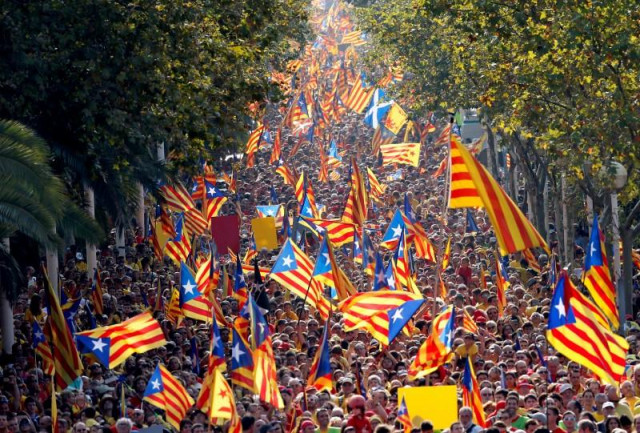Catalan leader says region has 'won the right' to secede from Spain
Videos posted on social media show police dragging voters from polling stations by their hair

People hold Catalan separatist flags known as "Esteladas" during a gathering to mark the Calatalonia day "Diada" in central Barcelona, Spain. PHOTO: REUTERS
His declaration appeared to set the restive region on course for a deeper split with the Spanish government, after Prime Minister Mariano Rajoy reiterated his government's position that the vote was an illegal act, to which the state had reacted "with firmness and serenity".
Any attempt to unilaterally declare independence is almost certain to be opposed not just by Madrid but also by a large section of the Catalan population which is deeply split on the issue.
Over 840 people injured in Catalonia during referendum: Catalonia regional govt
The regional government said 2.26 million people actually took part in Sunday's referendum, or 42.3 percent of the electorate.
A jubilant Puigdemont said his people had "won the right to an independent state" and urged the European Union to stop looking "the other way".
Puigdemont has said that in the event of a "yes" victory he would declare independence for Catalonia, which accounts for 19 percent of Spain's economic output.
At least 92 people were confirmed injured out of a total of 844 who needed medical attention, Catalan authorities said.
Further adding to tensions, unions and Catalan associations called a region-wide strike for Tuesday due to "the grave violation of rights and freedoms," urging people to take to the streets.
Helmeted police armed with batons moved in en masse early Sunday to seal off polling stations and seize ballot boxes, sparking clashes.
Videos posted on social media showed police dragging voters from polling stations by their hair, throwing people down stairs and attacking Catalan firefighters protecting polling stations..
Rajoy declared the plebiscite had been blocked, and called the vote a process that "only served to sow division, push citizens to confrontation and the streets to revolt", but left the door potentially open to negotiations on greater autonomy for the region.
The referendum was organised under the threat of reprisals and criminal charges but thousands of Catalans stood in defiance of the central government crying "Votarem" - "We will vote".
Puigdemont said in an address after polls closed: "With this day of hope and suffering, the citizens of Catalonia have won the right to an independent state in the form of a republic."
The referendum law foresees a declaration of independence soon after a "yes" vote but it remains unclear if the regional government will actually do so.
Even before the vote, judicial officials ordered police to seize ballot papers, detain key organisers and shut down websites promoting the referendum after Madrid and the courts deemed it unconstitutional.
Thousands of people had gathered outside polling stations before dawn, joining those who had spent the night camped inside to ensure they would be open on the day.
In central Barcelona, riot police charged at demonstrators who were sitting on the ground at a polling station, and fired rubber bullets, witnesses said.
Riot police also stormed a polling station near Girona, smashing the glass doors of the sports centre where Puigdemont was due to vote and cutting a chain to force their way in.
But Puigdemont managed to vote anyway in nearby Cornella del Terri.
The crackdown drew a sharp rebuke from Catalan leaders and others including Nicola Sturgeon, leader of the pro-independence Scottish National Party.
The trouble caused Barcelona football club to play its La Liga tie against Las Palmas behind closed doors after the Spanish league refused to postpone the match.
But in several areas, voting was peaceful.
Under a sea of umbrellas outside a school in Barcelona, a crowd gathered, among them elderly people in wheelchairs, families with baby carriages and parents clutching toddlers by the hand.
With no police in sight, they were able to cast their ballots, prompting scenes of jubilation.
What you need to know about Catalan independence vote
"That's the great hope, to be able to vote freely like this despite the problems we've faced, I'm very happy. I can die peacefully," said Jose Mas Ribas, 79.
Although Catalans are divided over independence, most want to vote on the matter in a legal and binding plebiscite.
Catalonia already has significant control over education, healthcare and welfare, but the region says it pays more in taxes than it receives from Madrid.



















COMMENTS
Comments are moderated and generally will be posted if they are on-topic and not abusive.
For more information, please see our Comments FAQ